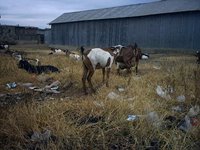:::::::::::::::::::::::::::::::::::::::::::::::::::::::::::::::::::::::::::::::::::::::::::::::::::::
Goats
***** Location: Kenya, other areas
***** Season: Non-seasonal Topic
.......... for kigo see below, sheep
***** Category: Animals
*****************************
Explanation
Goats are a non-seasonal topic for haiku.
Capra hircus, the domestic goat, has been domesticated for more than 9000 years.
Goats are very important animals in Kenya.
Goat meat
a kigo for the hot and dry season.
xxxxxxxxxxxxxxxxxxxxxxxxxxxxx

© Photos by Patrick Wafula, 2006
xxxxxxxxxxxxxxxxxxxxxxxxxxxxx
Dairy Goat and Capacity Building Project (Kenya)
Farmafrica.org
The project aims to ensure sustainable community-based dairy goat production and animal healthcare systems are established, strengthened and supported by community-based organisations and local extension services. We will work closely with farmers and government staff to develop appropriate systems in the dry Mwingi and Kitui Districts of Eastern Kenya. FARM-Africa's approach here is to build on its experiences in Meru and in Ethiopia, Tanzania and Uganda and to share our successes with farmers in a range of environments in sub-Saharan Africa.
To read more, click HERE.
*****************************
Worldwide use
Japan
"mountain sheep", yagi 山羊 goat
hitsuji 羊 sheep
*****************************
Things found on the way
HUMSHAKAL
A large brick arch leads off the bustling main road into a maze of narrow lanes with crumbling buildings. Here there are no glitzy shops, no smart display windows, no luxury goods to display. Poverty hangs in the air like a pervasive smell.
“Eh bhai!”
It’s only when the caller repeats it a third time that I realise he means me. “Come over here please,” he says when I turn around. “Usmanbhai is calling you.”
I follow him. A tall man with a hennaed beard stands at the roadside smiling. “Hello Usmanbhai,” I say. “You were calling me?”
“I’m not Usmanbhai. That’s him over there,” the man says, pointing to one of three men seated on a charpoy a little farther on. Usmanbhai gets up from his charpoy as I approach. He too is smiling broadly.
“Iqbalbhai!”
His smile wavers as I show no sign of recognition.
“Iqbalbhai? You are Iqbalbhai, aren’t you? Iqbalbhai from Palanpur?”
“I’m sorry, but I’m not Iqbalbhai.” I feel vaguely and irrationally apologetic for not being Iqbalbhai.
“Well.” Usmanbhai shakes his head in disbelief. “Well, what a thing! I could have sworn you were Iqbalbhai. I was just saying to my friends – what on earth is Iqbalbhai doing here? You look exactly like him from the front, from the side, even from behind!”
“No, I’m afraid I’m not Iqbalbhai. This seems to be one of those humshakal* cases.”
“Well, I’m sorry to have bothered you. Hope you aren’t annoyed.”
I continue on my way, wondering who Iqbalbhai might be.
dusty street
a goat shares a doorstep
with three children
Back home, I take a long look at myself in the mirror.
Palanpur? No, I’ve never been there.
*Doppelgänger
- Shared by Johannes Manjrekar
Joys of Japan, March 2012
*****************************
HAIKU
cows and goats
scatered all over the place
grazing up and down
Miriam Nyambura (Bamboochas), Winner of May 2006 Ginkoo
:::::::::::::::::::::::::::::::::::::::::::::::::::::::::::::::::::::::::::::::::::::::::::::::::::::
tag of war --
two goats pulling a tread
of dry grass
Brian Etole
Peacock, Kenya October 2010
:::::::::::::::::::::::::::::::::::::::::::::::::::::::::::::::::::::::::::::::::::::::::::::::::::::
hot noon-
a goat rests under
a cactus shadow
Jacinta
:::::::::::::::::::::::::::::::::::::::::::::::::::::::::::::::::::::::::::::::::::::::::::::::::::::
smiling farmer--
a goat delivers identical
twins
Ephantus Kamara
:::::::::::::::::::::::::::::::::::::::::::::::::::::::::::::::::::::::::::::::::::::::::::::::::::::
dusty wind --
a tethered goat sneezes
again and again
Brian Etole
January 2011
:::::::::::::::::::::::::::::::::::::::::::::::::::::::::::::::::::::::::::::::::::::::::::::::::::::
dry evening--
a goat bends to drink
sewage water
Caxton Okoth
*****************************
Related words
***** Maasai Cattle (Masai Cattle)
:::::::::::::::::::::::::::::::::::::::::::::::::::::::::::::::::::::::::::::::::::::::::::::::::::::
***** Sheep (hitsuji)
With no further addition, this is a topic.
non-seasonal topic
kigo for late spring
hitsuji no ke karu 羊の毛刈る (ひつじのけかる)
shearing sheep
..... hitsuji senmo0 羊剪毛(ひつじせんもう)
. . . CLICK here for Photos !
yagi no ke karu 山羊の毛刈る(やぎのけかる)shearing goats
senmooki 剪毛期(せんもうき)time for shearing (sheep, goat etc.)
.................................................................................
ENGLAND
Around 500 professional shearers, many of them Jackaroos – cowboys adept at ranch and farm skills – or their female equivalent Jillaroos, have been travelling to the UK for decades to help cut the fleeces of the 25million-strong national flock during the main shearing season, from May 1 to the end of July.
source : www.dailymail.co.uk
.................................................................................
ROMANIA
In Romania is a true national holiday, shearing sheep.
Sheep are gathering up the first day of May. In other areas of the country shearing begins in March.
Sheep must be shorn to be not hot in summer and to be easier milking.
Mountain climbing on alpine pastures, starts on June 1 with both the sheep and cattle.
Alex Serban
.................................................................................
June cold--
sheep huddling in the middle
of the slum road
Caleb Mutua, Kenya 2010
:::::::::::::::::::::::::::::::::::::::::::::::::::::::::::::::::::::::::::::::::::::::::::::::::::::
dusty street--
a pregnant goat feeds
on mango peels
Patrick Wafula
January 2011
[ . BACK to WORLDKIGO . TOP . ]
:::::::::::::::::::::::::::::::::::::::::::::::::::::::::::::::::::::::::::::::::::::::::::::::::::::






4 comments:
Christmas 2007
> gleaming
> lips and cheeks--
> roast goat meat
> sharing goat
> meat and soup--
> old couple together
Read more here :
Patrick Sensei, Kenya Saijiki Forum
Goats up in a tree
View pedestrians with scorn
“We don’t graze, we browse!”
thanks, Res!
This is a work in progress.
The Kenya haijin are currently collecting haiku on goats and goatmeat. Goats are a very important ingredient of the most important festivals in the country. They are fattened for these festivals, then slaughtered and the meat is eaten in an extended family circle. In many parts of Kenya, tradition prescribes which family member should eat which part of the goat, and if that family member is not present, the part must be brought to him or her.
Post a Comment